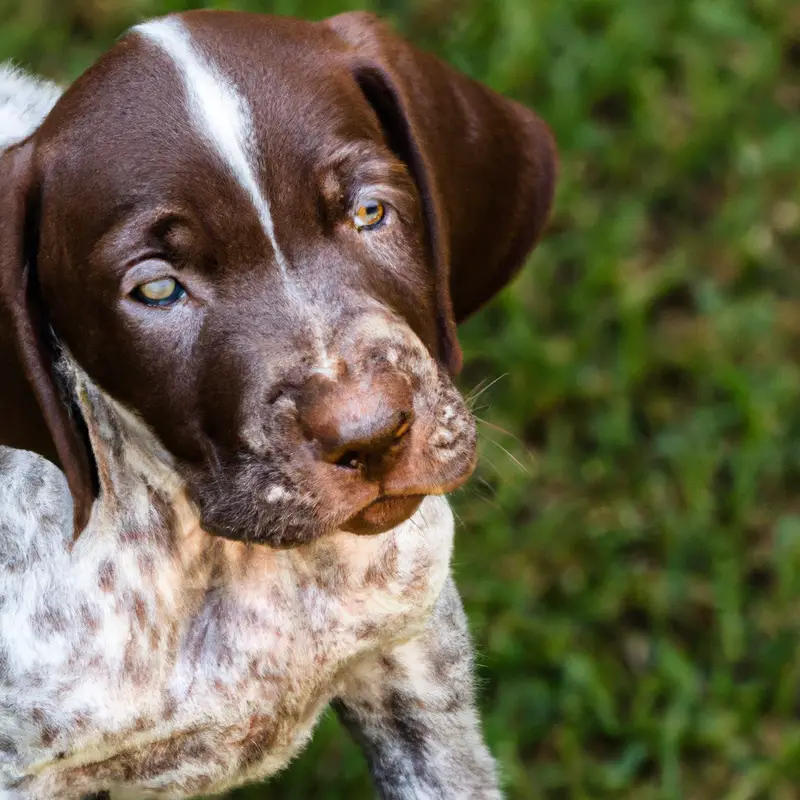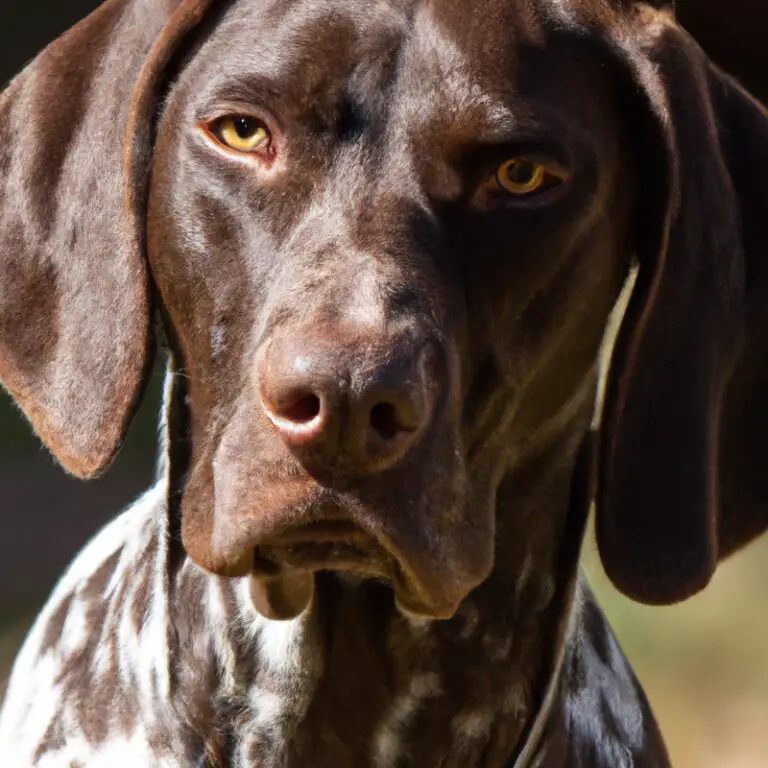What Are The Signs Of a German Shorthaired Pointer Having Dental Problems Or Toothache?
Key Takeaways:
- Reluctance to eat or chew.
- Excessive drooling or pawing at the mouth.
- Bad breath or swollen gums.
- Loose or missing teeth.
Have you ever wondered if your beloved German Shorthaired Pointer is experiencing dental problems or toothache? As a proud owner of this magnificent breed, I understand the importance of maintaining their overall health, and dental health plays a crucial role.
In this article, I will share the telltale signs that indicate your German Shorthaired Pointer may be suffering from dental issues or a toothache.
From behavioral changes to physical manifestations, we’ll explore it all. So, join me as we unravel the secrets to a healthy and happy smile for your furry companion.
| Signs of Dental Problems in a German Shorthaired Pointer |
|---|
| 1. Bad breath |
| 2. Excessive drooling |
| 3. Difficulty eating or chewing |
| 4. Bleeding or swollen gums |
| 5. Discolored or broken teeth |
| 6. Pawing at the mouth |
| 7. Loose or missing teeth |
Signs of Dental Problems in German Shorthaired Pointers
Importance of Dental Health for German Shorthaired Pointers
Dental health is crucial for German Shorthaired Pointers. Taking care of their teeth is important for their overall well-being.
First and foremost, good dental health helps prevent dental problems such as tooth decay, gum disease, and bad breath.
Imagine having a toothache or difficulty eating – it’s not pleasant, right? The same goes for our furry friends.
Regular dental care can prevent discomfort and pain for German Shorthaired Pointers.
Additionally, maintaining dental health can have a positive impact on their overall health. Dental issues can lead to infections that may spread to other parts of their body, putting their organs at risk.
By brushing their teeth regularly and getting professional dental cleanings, we can help prevent these complications.
Furthermore, dental health can contribute to a dog’s longevity. A healthy mouth means a healthier dog, increasing their chances of living a longer, happier life.
Plus, it can save you from costly veterinarian bills down the road.
So, don’t overlook the importance of dental health for your German Shorthaired Pointer. Take the necessary steps to keep their teeth clean and healthy, and they’ll thank you with their wagging tails and joyful smiles!
Behavioral Signs of Dental Problems in German Shorthaired Pointers
Behavioral Signs of Dental Problems in German Shorthaired Pointers Now, let’s talk about some common behavioral signs that may indicate dental problems in your German Shorthaired Pointer. Remember, these signs might not always be explicit, but they can give you some clues about your dog’s oral health.
- Excessive drooling: If you notice that your GSP is drooling more than usual, it could be a sign of dental issues. Excessive drooling may indicate pain or discomfort in their mouth.
- Bad breath: We all know dog breath isn’t exactly a bed of roses, but if your German Shorthaired Pointer’s breath smells unusually foul, it could be a sign of dental problems such as gum disease or tooth decay.
- Reluctance to eat: Dental issues can make it painful for your furry friend to chew their food. If they suddenly become hesitant or show decreased appetite, it may be because their teeth or gums are hurting.
- Pawing at the mouth: Your German Shorthaired Pointer may paw at their mouth if they are experiencing dental pain. It’s their way of trying to alleviate discomfort or get your attention.
- Behavioral changes: Dental problems can cause irritability, aggression, or even depression in dogs. If you notice any abrupt changes in your GSP’s behavior, it’s worth considering their oral health as a potential factor.
Physical Signs of Dental Problems in German Shorthaired Pointers
German Shorthaired Pointers can experience dental problems, just like humans. It’s important to keep an eye out for any physical signs that may indicate dental issues.
These signs include:
- Bad breath: If your German Shorthaired Pointer suddenly has persistent bad breath, it could be a sign of dental disease or infection.
- Discolored or broken teeth: Take a closer look at your dog’s teeth. If you notice any discoloration or broken teeth, it could indicate dental problems.
- Gum inflammation: Swollen, red, or bleeding gums may suggest gum disease or infection. Check for any signs of inflammation in your dog’s mouth.
- Difficulty eating or chewing: Dental problems can make it painful for your dog to eat or chew. If they are avoiding certain foods, dropping food while eating, or showing signs of discomfort during mealtime, it may be due to dental issues.
- Excessive drooling: While some drooling is normal for dogs, excessive drooling can be a sign of dental problems. Keep an eye out for any changes in your dog’s drooling habits.
Common Dental Problems in German Shorthaired Pointers
Dental Tartar and Plaque Build-up in German Shorthaired Pointers
Dental tartar and plaque build-up can be common problems for German Shorthaired Pointers. These issues occur when bacteria and food particles form a sticky film on the teeth, known as plaque.
Over time, if this plaque isn’t removed, it can harden into tartar, which can lead to dental problems.
To help prevent dental tartar and plaque build-up in German Shorthaired Pointers, regularly brushing their teeth is essential. You can use a dog-specific toothbrush and toothpaste to gently brush their teeth a few times a week.
Additionally, feeding them a balanced diet and providing appropriate chew toys can also help remove plaque and stimulate their gums.
Regular dental check-ups with a veterinarian are important to catch any dental issues early on.

Periodontal Disease in German Shorthaired Pointers
Periodontal disease is a common dental problem in German Shorthaired Pointers. It occurs when plaque and tartar build-up on their teeth, leading to inflammation and infection of the gums.
The signs of periodontal disease include bad breath, swollen or bleeding gums, loose teeth, and difficulty eating.
Regular dental care, such as brushing their teeth and providing dental chews, can help prevent periodontal disease. It’s essential to have your German Shorthaired Pointer’s teeth checked by a veterinarian regularly and schedule professional dental cleanings as needed to keep their oral health in check.

Broken or Cracked Teeth in German Shorthaired Pointers
Broken or cracked teeth can be a common dental problem in German Shorthaired Pointers. It’s important to be aware of the signs so you can address the issue promptly.
First and foremost, pay attention to any changes in your dog’s eating habits.
If they’re suddenly avoiding hard foods or acting hesitant to chew, it could be a sign of dental pain. You may also notice your dog pawing at their mouth or drooling excessively.
Another sign to watch for is bad breath.
While dog breath isn’t exactly pleasant, a sudden and persistent foul odor could indicate an infection or dental issue. If you suspect your German Shorthaired Pointer has a broken or cracked tooth, it’s best to schedule a dental exam with your veterinarian.
They can assess the tooth and recommend the appropriate treatment, which may include extraction or dental surgery.

How to Prevent and Manage Dental Problems in German Shorthaired Pointers
Regular Dental Care Routine for German Shorthaired Pointers
Regular dental care is essential for the overall health and well-being of your German Shorthaired Pointer. Here’s a simple routine you can follow to keep their teeth clean and healthy:
- Brush their teeth regularly: Use a soft-bristled toothbrush and toothpaste specially formulated for dogs. Brush their teeth at least 2-3 times a week to remove plaque and prevent gum disease.
- Provide dental chews or toys: Give your GSP dental chews or toys that promote chewing. These help to remove tartar and keep their teeth strong. Look for products that are safe and recommended by veterinarians.
- Schedule professional dental cleanings: Regular visits to the vet for dental cleanings are crucial. A professional cleaning will remove any stubborn tartar and check for any underlying dental problems.
- Watch for signs of dental issues: Keep an eye out for signs of dental problems like bad breath, swollen gums, loose or broken teeth, excessive drooling, and difficulty eating. If you notice any of these, consult your vet.
Proper Diet and Nutrition for Good Dental Health
Proper diet and nutrition play a key role in maintaining good dental health for your German Shorthaired Pointer. Here are some tips to keep in mind:
- Choose the right food: Opt for high-quality, balanced dog food that is specifically formulated for dental health. Look for options that promote chewing and support tartar control.
- Incorporate dental treats: Treats designed to promote dental health can also be a great addition to your dog’s diet. These treats are designed to help clean teeth and reduce plaque buildup.
- Include crunchy fruits and vegetables: Adding crunchy fruits and vegetables like carrots and apples can naturally help clean your dog’s teeth while providing essential vitamins and minerals.
- Avoid sugary and sticky foods: Just like in humans, sugary and sticky foods can be harmful to your dog’s teeth. Avoid feeding them sugary snacks or human food that can get stuck between their teeth.
- Maintain dental hygiene: Along with a proper diet, regular dental hygiene is crucial for good dental health. This includes brushing your dog’s teeth regularly and scheduling routine dental check-ups with your veterinarian.
Professional Dental Cleaning for German Shorthaired Pointers
Professional dental cleaning is an important aspect of maintaining the oral health of German Shorthaired Pointers. During the cleaning, a veterinarian will carefully examine your dog’s teeth and gums to identify any signs of dental problems, such as gum disease or tooth decay.
They will then use special tools to remove tartar and plaque buildup, both above and below the gumline.
This procedure helps prevent tooth loss, bad breath, and other oral health issues. It is recommended to schedule regular professional dental cleanings for your German Shorthaired Pointer to keep their teeth and gums in top shape.
When to Seek Veterinary Assistance for Dental Problems in German Shorthaired Pointers
Importance of Regular Veterinary Check-ups
Regular veterinary check-ups are crucial for maintaining the overall health and well-being of your German Shorthaired Pointer. By scheduling routine visits, you can catch any potential health issues early on and prevent them from becoming more serious problems later.
During these check-ups, your veterinarian will examine your dog’s teeth, gums, and oral health to ensure everything is in good condition.
Additionally, they can provide guidance on dental care practices and recommend professional cleanings, if necessary.
Recognizing the Severity of Dental Problems
Recognizing the severity of dental problems in your German Shorthaired Pointer is important for their overall health and well-being. While it’s normal for dogs to have occasional bad breath or minor tartar buildup, there are signs that indicate a more serious dental problem.
Here are a few things to look out for:
- Persistent bad breath: If your dog’s breath consistently smells foul, it could be a sign of advanced dental disease or infection.
- Difficulty eating or dropping food: Painful teeth or gums can make it difficult for your dog to chew their food properly, leading to a loss of appetite or even weight loss.
- Excessive drooling: Increased drooling may be a sign of dental pain or discomfort, especially if it is accompanied by swelling or bleeding gums.
- Red or swollen gums: Healthy gums should be pale pink, so if you notice redness, swelling, or bleeding, it could indicate gum disease or an infection.
- Tooth discoloration or loss: Discolored teeth or missing teeth can be a sign of advanced dental disease and should be examined by a veterinarian.
If you notice any of these signs, it’s important to seek veterinary assistance as soon as possible. Dental problems in German Shorthaired Pointers can be painful and may lead to more serious health issues if left untreated.
Your veterinarian will be able to assess the severity of the problem and recommend appropriate treatment options to keep your dog’s teeth and gums healthy.
Treatment Options for Dental Problems in German Shorthaired Pointers
Treating dental problems in German Shorthaired Pointers requires a combination of professional veterinary care and at-home dental care. Here are some treatment options to consider:
- Professional dental cleaning: Regular dental cleanings performed by a veterinarian are essential for maintaining your German Shorthaired Pointer’s oral health. This involves removing tartar and plaque buildup, as well as identifying and addressing any underlying dental issues.
- Extraction of damaged teeth: In some cases, a tooth may be too damaged or infected to save. Your vet may recommend extracting the tooth to prevent further pain and infection.
- Antibiotics and pain medication: If your German Shorthaired Pointer is experiencing dental pain or infection, your vet may prescribe antibiotics to alleviate the infection and pain medication to manage any discomfort.
- Dental diet and treats: Feeding your dog a dental-specific diet or providing dental treats can help reduce plaque buildup and promote good oral hygiene.
- Regular brushing: Establishing a routine of brushing your German Shorthaired Pointer’s teeth can help prevent dental problems. Use a dog-friendly toothbrush and toothpaste to gently clean their teeth and gums.
Summary of Dental Health Tips for German Shorthaired Pointers
Importance of Early Detection and Prevention
Importance of Early Detection and Prevention Early detection and prevention play a crucial role in maintaining good health, and this applies to dental health as well. When it comes to dental problems in German Shorthaired Pointers, early detection can help prevent further complications and discomfort for your furry friend.
By recognizing the signs of dental problems early on, such as bad breath, swollen gums, or difficulty chewing, you can take the necessary steps to address the issue promptly.
Regular dental check-ups and cleanings are essential for early detection and to prevent more serious dental issues from developing. Implementing a preventive dental care routine, including regular brushing and providing appropriate chew toys, can go a long way in preventing dental problems before they even start.
By paying attention to your German Shorthaired Pointer’s dental health and taking proactive measures, you can keep their teeth and gums healthy and ensure they lead a happy and pain-free life.
Regular Dental Care for a Healthy German Shorthaired Pointer
Regular dental care is crucial for maintaining the overall health of your German Shorthaired Pointer. By taking care of your dog’s teeth and gums, you can help prevent dental issues such as gum disease, tooth decay, and bad breath.
Here are some important steps to ensure a healthy dental routine for your furry friend:
- Brush their teeth regularly: Use a dog-specific toothbrush and toothpaste to gently brush their teeth. Aim for at least two to three times a week to remove plaque and tartar buildup.
- Provide dental chews and toys: Chewing on appropriate toys or dental chews helps to keep your dog’s teeth clean by reducing plaque buildup. Opt for products that are specifically designed to promote dental health.
- Schedule regular dental check-ups: Just like humans, dogs need regular dental check-ups. Take your German Shorthaired Pointer to the vet for professional cleanings and examinations to catch any potential dental problems early on.
- Watch out for signs of dental issues: Keep an eye out for signs of dental problems such as bad breath, bleeding gums, excessive drooling, difficulty chewing, and pawing at the mouth. If you notice any of these symptoms, consult your vet immediately.
Veterinary Support for Optimal Dental Health
Veterinary support plays a vital role in maintaining the optimal dental health of your German Shorthaired Pointer. Regular check-ups with your vet are essential to catch any dental problems early on.
They can also provide professional teeth cleaning to remove tartar buildup.
The vet can assess the overall oral health of your dog and detect any signs of tooth decay, gum disease, or infections. They may recommend dental diets, dental chews, or special dental care products to keep your pup’s teeth clean and healthy.
Don’t forget to follow your vet’s advice for proper dental care at home too!
Final Verdict
It is crucial for German Shorthaired Pointer owners to be aware of the signs of dental problems or toothache in their furry friends. By understanding the importance of dental health and recognizing both behavioral and physical signs of dental issues, we can take proactive steps to prevent and manage dental problems.
Regular dental care, proper diet, and professional cleanings are essential for maintaining optimal dental health in German Shorthaired Pointers.
Additionally, regular veterinary check-ups and early treatment can help prevent serious complications. By prioritizing dental health, we can ensure our German Shorthaired Pointers live happy and healthy lives.







